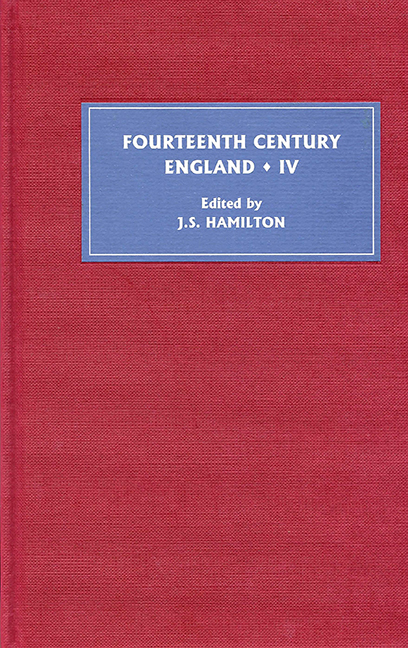Book contents
- Frontmatter
- Contents
- List of Illustrations
- Contributors
- Preface
- Abbreviations
- Who was St Thomas of Lancaster? New Manuscript Evidence
- ‘Hedging, Ditching and Other Improper Occupations’: Royal Landscapes and their Meaning under Edward II and Edward III
- Paying for the Wedding: Edward III as Fundraiser, 1332–3
- The Politics of Privilege: Thomas Hatfield and the Palatinate of Durham, 1345–81
- Agnes Maltravers (d. 1375) and her Husband John (d. 1364): Rebel Wives, Separate Lives, and Conjugal Visits in Later Medieval England
- Gendering Pastoral Care: John Mirk and his Instructions for Parish Priests
- Prosecution of the Statutes of Provisors and Premunire in the King's Bench, 1377–1394
- ‘Mercy and Truth Preserve the King’: Richard II's Use of the Royal Pardon in 1397 and 1398
- Aliens in the Pardons of Richard II
- ‘Too Flattering Sweet to be Substantial’? The Last Months of Thomas, Lord Despenser
- ‘O Prince, Desyre to be Honourable’: The Deposition of Richard II and Mirrors for Princes
- Regional Politics, Landed Society and the Coal Industry in North-East England, 1350–1430
Paying for the Wedding: Edward III as Fundraiser, 1332–3
Published online by Cambridge University Press: 12 September 2017
- Frontmatter
- Contents
- List of Illustrations
- Contributors
- Preface
- Abbreviations
- Who was St Thomas of Lancaster? New Manuscript Evidence
- ‘Hedging, Ditching and Other Improper Occupations’: Royal Landscapes and their Meaning under Edward II and Edward III
- Paying for the Wedding: Edward III as Fundraiser, 1332–3
- The Politics of Privilege: Thomas Hatfield and the Palatinate of Durham, 1345–81
- Agnes Maltravers (d. 1375) and her Husband John (d. 1364): Rebel Wives, Separate Lives, and Conjugal Visits in Later Medieval England
- Gendering Pastoral Care: John Mirk and his Instructions for Parish Priests
- Prosecution of the Statutes of Provisors and Premunire in the King's Bench, 1377–1394
- ‘Mercy and Truth Preserve the King’: Richard II's Use of the Royal Pardon in 1397 and 1398
- Aliens in the Pardons of Richard II
- ‘Too Flattering Sweet to be Substantial’? The Last Months of Thomas, Lord Despenser
- ‘O Prince, Desyre to be Honourable’: The Deposition of Richard II and Mirrors for Princes
- Regional Politics, Landed Society and the Coal Industry in North-East England, 1350–1430
Summary
In 1331, at the tournament organised by his friend William de Montacute in Cheapside, London, the king's sister Eleanor was accorded a prominent place in the associated procession, where her beauty made a strong impression. There was a sound practical reason for this: Eleanor was on the marriage market. Eleanor was the elder of the king's two sisters and her marriage had been of diplomatic importance for a number of years. In 1325, when she was seven, her father had tried to arrange her wedding to Alfonso V of Castile. In 1329 she was proposed as bride of the future John II of France, while in 1330 there were plans to marry her to Pedro, the heir to Alfonso IV of Aragon. Now, in 1331 the prospective bridegroom was a widower, Reginald (or Reynald) II, count of Guelders. This time negotiations bore fruit and the couple were married in May of the following year.
Edward III wanted to see his sister off in style, for arranging her marriage was his first successful essay into European diplomacy, and, although the wedding itself took place in Guelders, this was the first time in his reign that Edward was able to have some impact upon the arrangements for an important and joyous occasion. His own wedding, to Philippa of Hainault in January 1328, had been arranged by his mother; and so was the wedding of his younger sister Joanna (or Jeanne), who married David, the future king of Scots, an alliance which was part of the treaty of Northampton. Edward disapproved so much of the treaty that he boycotted the marriage ceremony, which took place at Berwick in July 1328.
By contrast, Eleanor's marriage to the count of Guelders gave Edward III the excuse to show off, for he was a monarch who understood very well the importance of image and style as tools of government. The need to erase the memory of his father's dowdy court, coupled with his own enjoyment of jousting, feasting, music and drama, meant that he welcomed any excuse for ceremonial and for ordering expensive equipment and clothes.
- Type
- Chapter
- Information
- Fourteenth Century England IV , pp. 43 - 60Publisher: Boydell & BrewerPrint publication year: 2006

